Furano: A Chef and Maître d'hôtel Part1 - Spring and Summer
Leaving a popular Tokyo restaurant, Otsuka Kenichi and his wife Keiko relocated to Hokkaido Prefecture six years ago. There, they offer enticing, unique dishes with local flavors found nowhere else.
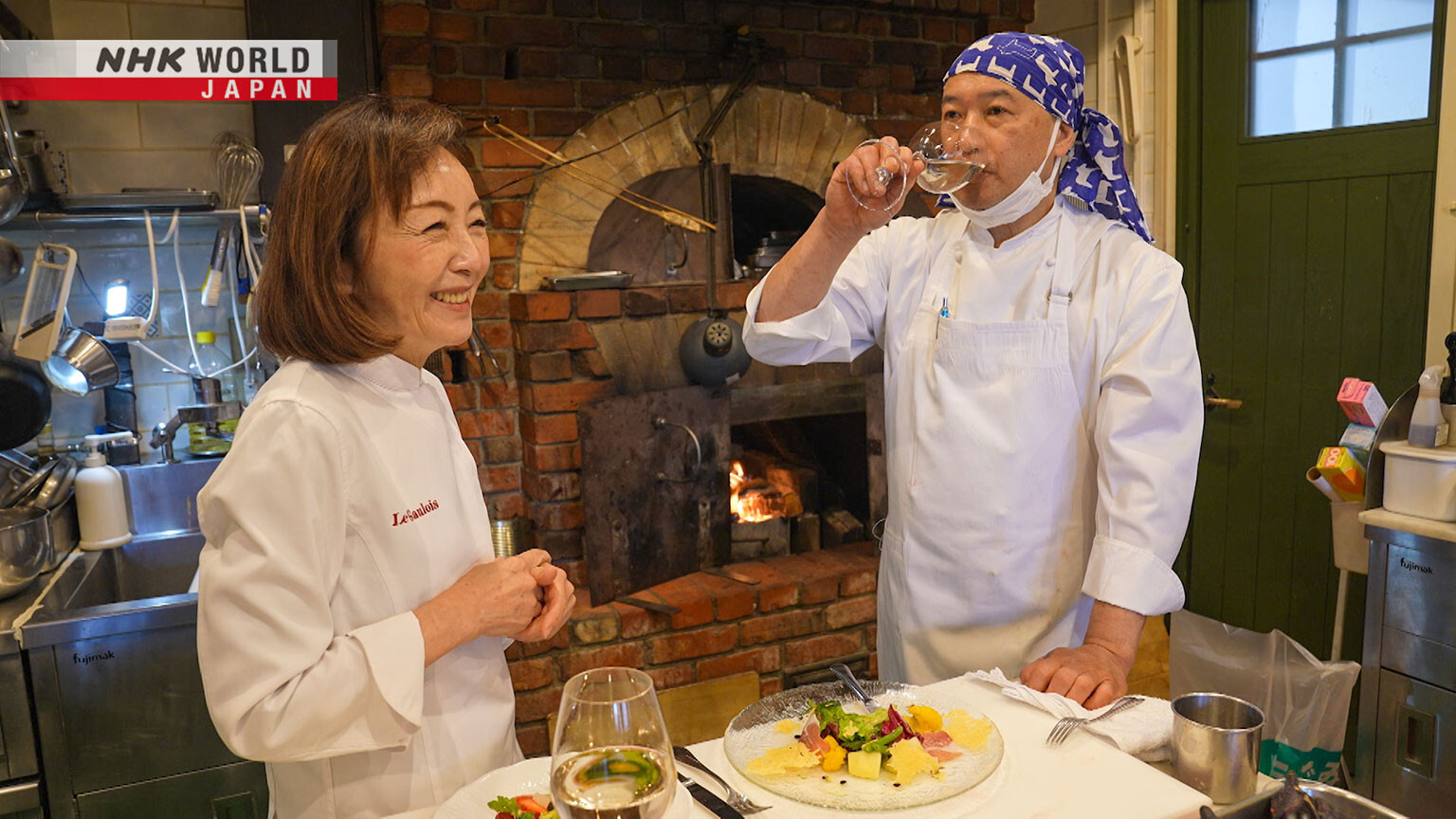
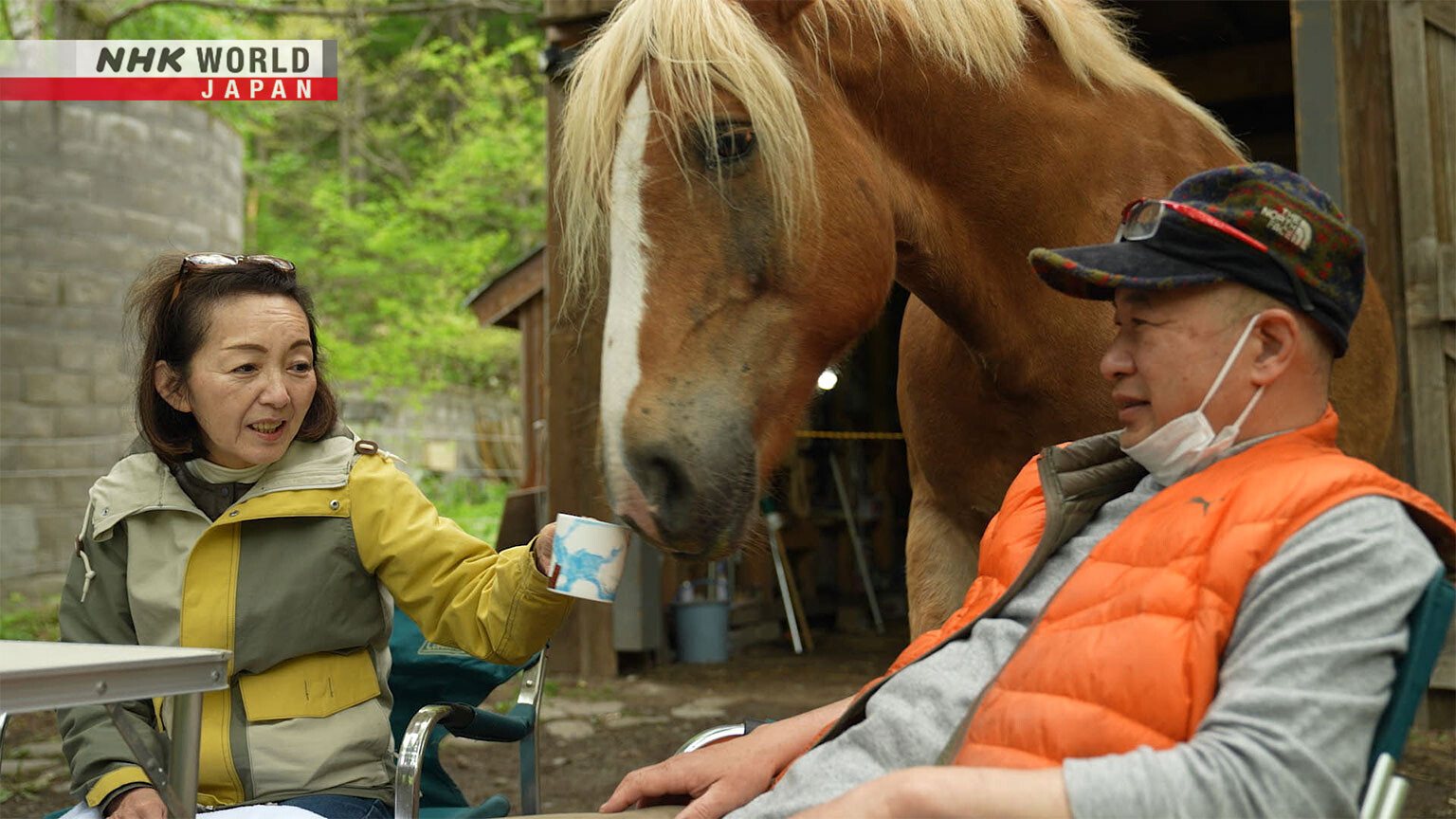
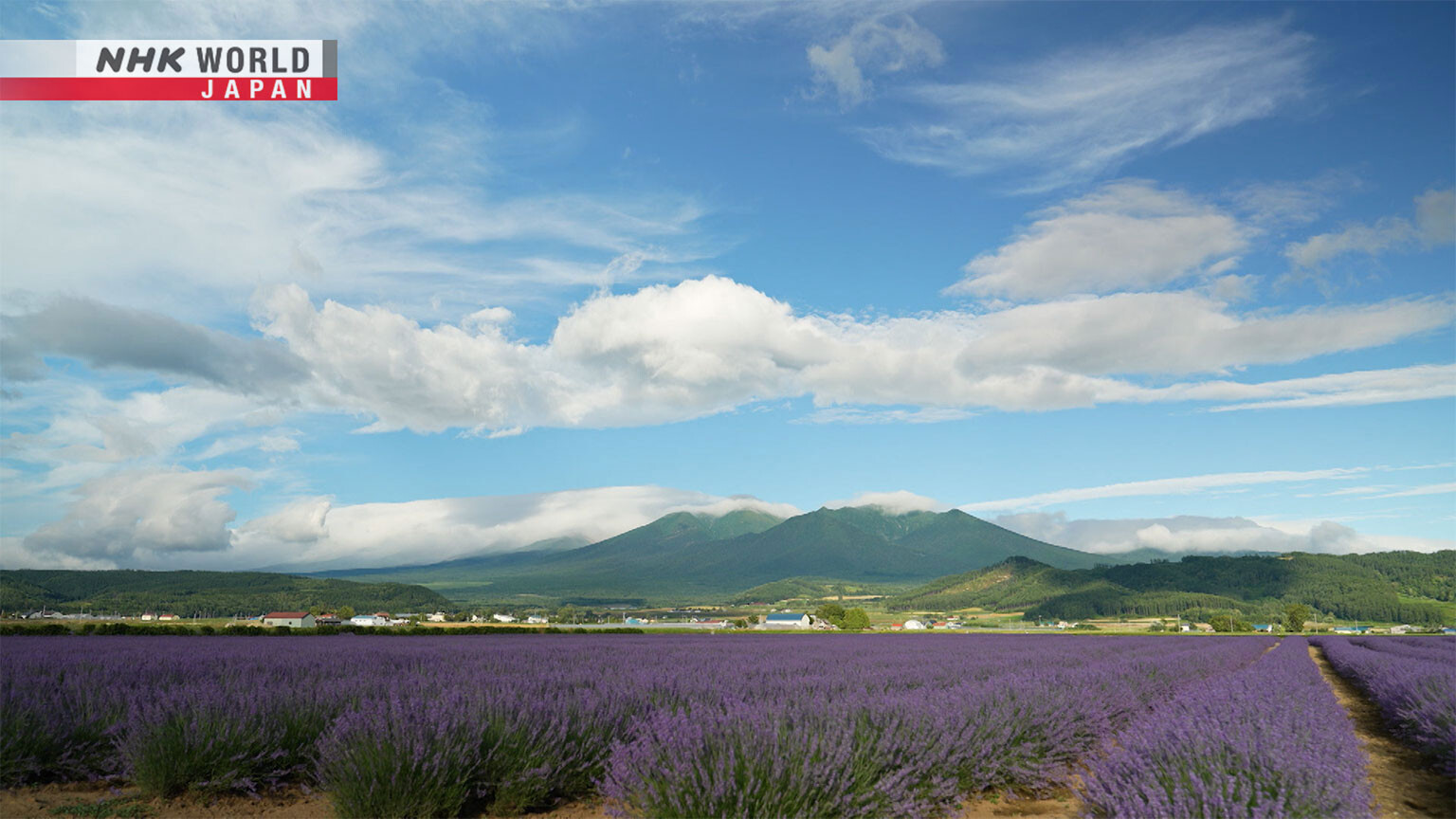
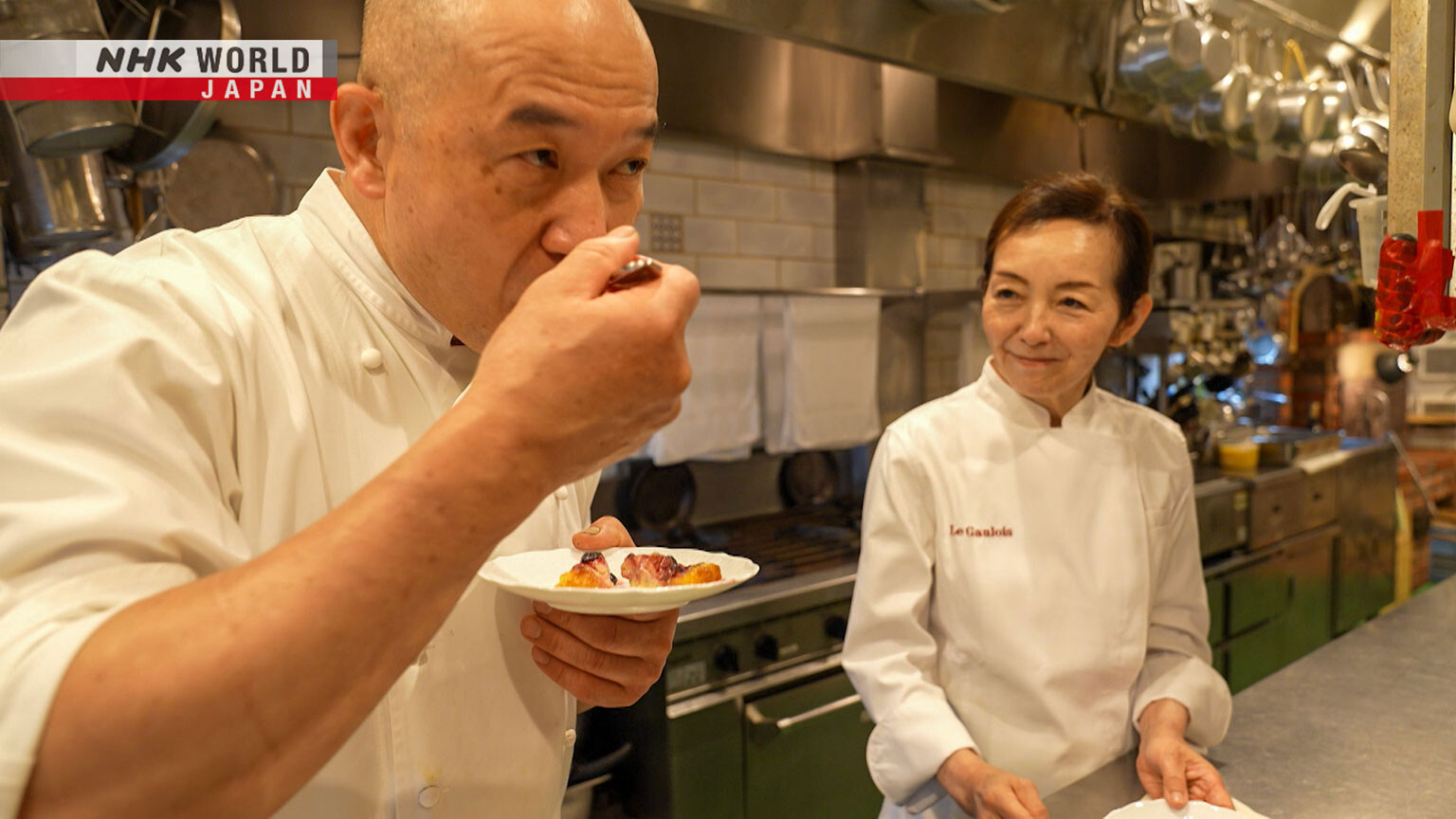
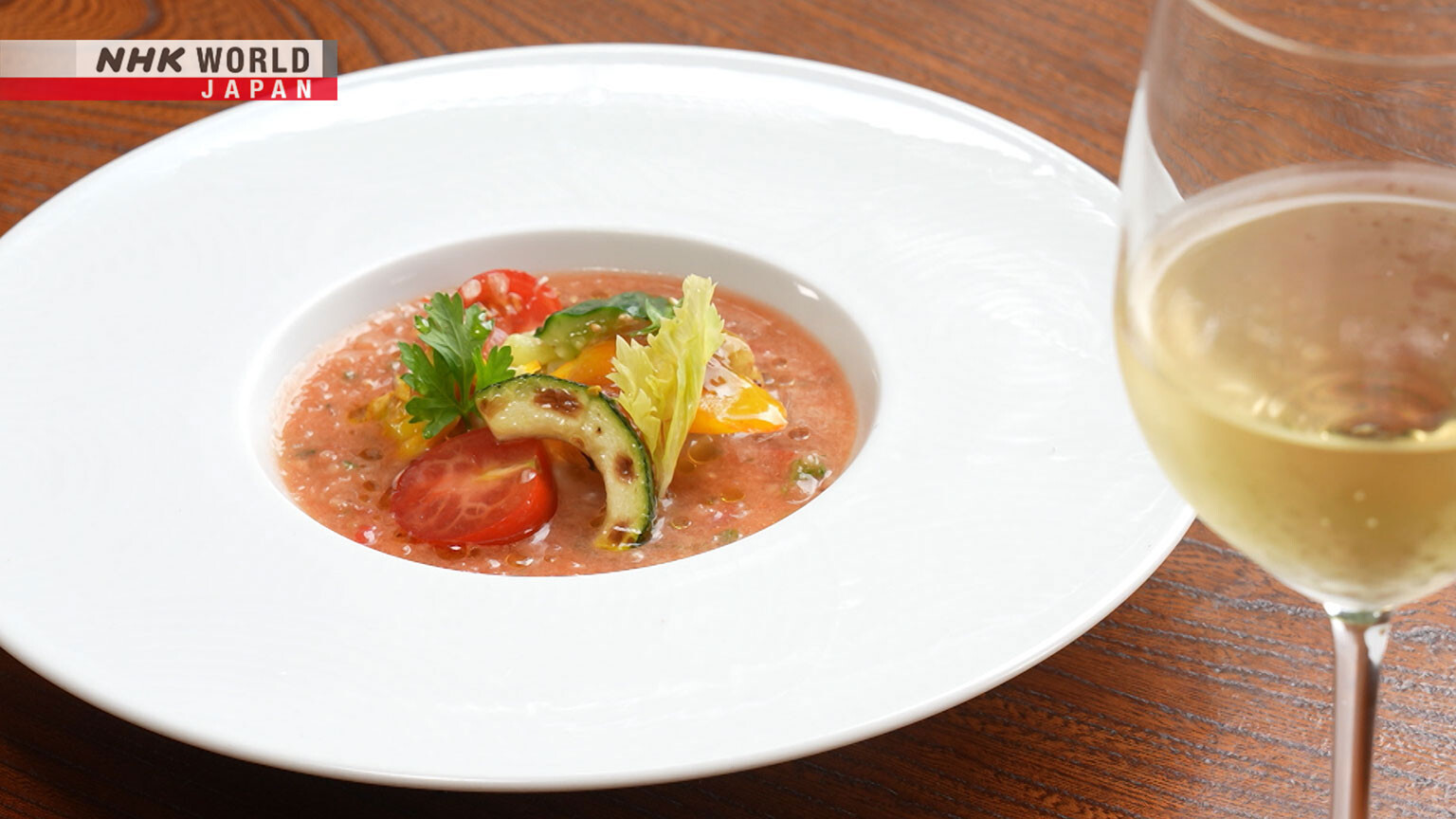
Transcript
A small restaurant, deep in the forest.
People from across Japan come for food made with fresh Hokkaido ingredients.
This broth tastes great.
For 20 years, Ohtsuka was owner-chef of a famous French restaurant in Tokyo.
In 2016, the Ohtsukas closed their restaurant and moved to Hokkaido.
A restaurant close to farms has better access to good ingredients.
That means better food for our guests.
Hello. I'm here for asparagus.
Don't they look good?
This is what I picked today.
Thank you very much.
I use organic, natural methods, so it's a fight against weeds.
I weed while I'm harvesting.
I want my asparagus to be the best.
Today's main ingredient is asparagus.
It's paired with smoked Hokkaido oysters.
Asparagus is also added to the main meat course.
Ready for the mains? Let's go.
Hi. Are you going fishing?
Nope. Farming like always.
Kitagawa was the first farmer that the Ohtsukas built a relationship with.
20 years ago, they ate his vegetables at a restaurant in Furano.
They were so good we visited his farm. He invited us in, and sat us down.
He said farming is the most noble work a person can do. It's a calling.
That spoke to me. He showed us what being a farmer really means.
It changed my perspective.
It tastes like pure water.
It would be amazing in soup.
The fibrous roots aren't thrown away.
They're added to stock for the soup.
I'm sorry but July is completely booked up. I do apologize.
The Yamadas are regulars so they don't need menus.
We're serving beef today. However there's also lamb and venison.
I noticed those. Which sounds better?
I can't choose. What a decision!
- Would you like some of each?
- Can we do that? Amazing!
Of course, shall I?
- Yes, please.
- Of course.
Their request goes straight to the kitchen.
I discuss and communicate the preferences of each guest.
Often, I'll request flavors or a particular cooking method.
I become their spokesperson. And in the kitchen, they make changes.
That's our job. We try to never say 'no.'
The Ohtsukas live in the mountains, a 40-minute drive from the restaurant.
They rented a run-down house from a friend, and first replaced the floors.
Their five cats are all former strays.
They also have four rescue horses.
Keiko loved horses even as a child.
Living with horses was a lifelong dream.
This is Akari, our first horse.
We adopted horses that were marked for slaughter. And she was the first.
They adopted Akari 14 years ago when they still lived in Tokyo.
She was boarded in Yamanashi prefecture, and they visited almost every week.
They began looking after three more horses marked for slaughter.
The move to Hokkaido was partly so they could live with their horses.
Now that we've moved I feel we've become a family.
In Tokyo, it was more that we paid for their keep. Now they're real family.
The Ohtsukas met when working at a Karuizawa hotel kitchen.
At the time, Keiko was an apprentice pastry chef.
They married a year after they met.
In 1997, they opened their own restaurant in Tokyo.
I was flailing in the dark at first. I didn't know what my style was.
Every day I'd keep guests waiting. Or we'd have no diners at all.
But Keiko supported me through it all. It was an experiment for both of us.
I got interested in ingredients, my raw materials.
What made people excited when they ate my food. That was the start of it.
This led to the creation of a salad.
It featured over 15 different ingredients from Hokkaido.
It was the result of meeting Hokkaido farmers like Kitagawa.
It's still a very popular, flagship item on the menu.
Kenichi's food became a hit as 'Hokkaido French' cuisine.
In 2006, they moved to larger premises.
But in 2016, they suddenly decided to move to Hokkaido.
It meant starting from scratch when they were in their 50s.
We started from nowhere. Visiting abandoned houses.
We looked at buildings in towns, but there wasn't much.
Our customers worried that we didn't have plans when we closed.
But we're always like that. We quit, and then we make plans.
But life in Hokkaido wasn't easy.
That year they were hit by four typhoons.
Their home was badly damaged.
Cleaning up was a pain.
Oh, it was awful. All that mud...
Every day was spent repairing the outside. Picking up trash.
We got a ton of trash. Buildings and pastures swept away.
Two years after moving they still hadn't found a potential restaurant.
The couple got by with part-time jobs, but in 2018, they received an offer.
A regular from their Tokyo restaurant asked them to run somewhere new.
Good girl! You're getting older, aren't you?
He's a leading scriptwriter that wrote a hit drama set in Furano.
It's all about the both of them. She really is extraordinary.
She's a perfect maître'd. That's very rare.
Gentle, soothing, and flexible. Service improves the food.
We talk about dining as though flavor is the only thing that counts.
That's wrong. A truly amazing meal appeals to all five senses.
It's why the fanciest city restaurants disappoint. No nature. No clean air.
Gazing at scenery like this, listening to birds, with good company.
They all affect the taste of your meal.
The restaurant opened in 2018 and quickly became a hit.
But just two years later came the pandemic.
Yet the Ohtsukas found support.
You see the farmers here get hit by bad weather, losing everything.
But they just shrug it off and grin, saying, 'Hey, you still alive?'
It's the only way to survive.
Why waste time crying over spilt milk?
In Furano, this season is known for 'spring's fall colors.'
We're dressed for the occasion.
Shall we?
Today they're foraging for vegetables.
Let's begin here today. Stick to easier paths.
- Wait, up there?
- That's right.
- Oh, huge leaves!
- I see them.
- Up there as well.
- There's a huge cluster.
This wild vegetable is a familiar sight in Hokkaido.
Its scent has a faint trace of garlic.
The Ainu - indigenous people of northern Japan - used it to ward off evil.
Avoid plants with only one leaf. They're still young.
- Focus on two-leaved plants.
- Got it.
Nice thick stem here.
See? Around the root.
- The Ainu eat it raw?
- Yes, with a little miso.
It's sweet! Delicious.
Very sweet.
No bitterness at all. It tastes so fresh.
Very thick, that's impressive.
It takes seven to eight years to grow this large.
Delicious, I love it. Such a delicate flavor.
Today the vet has come for a visit.
It's infected, so the vet will check his response to medication.
The vet has diagnosed Akari with laminitis.
The coffin bone comes away from the wall of the hoof and begins to sink.
In the worst case, she might lose the whole hoof.
It's not fatal by itself, but it is a reason to euthanize.
Because they can't walk.
- All we can do is keep it cold.
- You poor thing, it must hurt.
It's a big shock. It's age, I guess. This is what ageing means.
A horse's death is usually a case of falling dead in the field.
I hoped for something gentler. But they're part of our family.
We can't look away. We'll nurse her, make sure she has a quiet end.
One week later.
The vet has advised taking Akari and Lucas to a ranch for proper treatment.
An Ainu rite is held on the day that the climbing season begins.
The ceremony tells mountain and water deities of the hikers' presence.
And it prays for their safety.
Off you go.
Every summer the horses are sent to pasture in fields near the restaurant.
They remember.
They always do.
- They know.
- I'm glad.
Maybe the horses gain a sense of pride from being part of the landscape.
It's a nice change of pace. And our guests love seeing them.
It's steamed as soon as its picked, to maximize its flavor.
Steaming unshucked corn brings out its sweetness.
Sano has a 'Vegetable Appreciation Society' and grows a wide variety.
There's no seeds at this size. Good for eating.
Zucchini flowers. Very hard to harvest.
Look at this plant, growing as hard as it can.
Zucchini must be pollinated by hand.
This is done at 5 AM when the flowers open.
They grow fast, and are large enough to eat just five days later.
The vegetables are blended with clam stock, and shichimi seasoning.
Okay, done. That's good.
The vegetable topping is cooked.
Zucchini is fried in olive oil.
The cucumbers are crushed and dressed with olive oil and yuzu juice.
The eggplant is deep fried and soaked in a sweet and savory dashi.
A lot of Japanese flavors.
Yes, dashi stock, yuzu juice, and chili. I love them all.
The clams are flavored with saffron.
And the celery has been simmered.
- You seem busy.
- It's been crazy, a total mess.
I'm just glad your customers all came back.
- Hello!
- Hello!
Haskap berries are native to Hokkaido.
We've only got half the yield we did last year.
Really?
- So soft.
- They're good for your sight.
The sour edge perks you up.
- It's good.
- Sour but sweet.
The fruit is too delicate to ship. It's rare to see fresh ones in stores.
The most delicious things don't stand up to shipping.
I've yet to use fresh haskap berries.
When they're this ripe you'd have to serve them on site.
Keiko is working on a variety of haskap berry desserts.
Very good.
The berries are coated in melted butter and sugar.
They're laid on sponge cake along with a few strawberries.
A batter of eggs, sugar, and cream is ladled over.
Now they go in the oven.
Do you often boss the chef around?
Of course! Well, I don't boss him. But he helps me out a lot.
They bake for 30 minutes in a 180℃ oven.
I wanted a way to serve them that showcased their flavor.
But it's trial and error.
- Finding the balance.
- Today's pretty good.
It's delicious. A success.
Really good.
Oh, that is good.
Are you satisfied?
They're not perfect. I'd like to add something.
It's good. A gentle flavor.
The dish is a twist on clafoutis, a traditional French dessert.
This is the Ohtsukas' sixth summer in Hokkaido.
The seasons rush at you so fast, like the natural world is pushing us along.
That's our life now. We can't fight nature.
All we can do is wait out a headwind.
We're smaller and more fragile than I thought. I rather like that idea.
I'm happy just breathing the fresh air each day.
I want to breathe it in deep. Such a waste not to.
Word comes from the ranch about Akari and Lucas.
Here's Lucas. He's wearing a mask!
Lucas' swollen legs seem to be on the mend.
The progression of Akari's laminitis has also stopped.
They'll come back in autumn and we'll think about their future.
They're doing much better. We need to give them a good life.
- We'll study up on what to do.
- That's right.
- A lot to learn.
- We'll fix up the building.
Look at them all. Wow!
This is curry sauce. Curry pizza is good too.
Basil is here.
Kenichi is making pizza for local farmers as a thank-you for their work.
They bake in the heat from the bricks?
Heat from the side too.
- Did you make this yourself?
- Yeah.
Wow, when did you do that?
The Ohtsukas have known the Sano family for over 20 years.
The kids who were in elementary school are now grown farmers.
This is good! The curry pizza's really good.
What a luxury. A chef in our kitchen. I feel honored.
- Not much of a day off.
- A chance for me to learn.
- Congratulations!
- Thank you.
- What a cutie.
- 9 months old.
- She's nervous!
- Hiding her face.
Miyata Yuki is another farmer they've known since his childhood.
He said there's someone he wants to invite to the restaurant. A proposal!
You proposed at the Ohtsukas' restaurant?
- That's right.
- And I had a bouquet ready.
- I asked her to hide it.
- To hand over at the big moment.
I'm so grateful to have these family relationships.
We'll take our kids one day, which is wonderful. I hope it continues.
I feel like we keep collecting new relatives. All these children.
Can you say hi? No?
Wine has been made in Furano for the last 50 years.
Kenichi has already created a dish to pair with the new vintage.
There's a little sweetness after, but also a hint of the dryness.
It would pair well with something sweet.
Dry-cured ham is paired with pears and other ingredients.
A thin round of baked cheese goes on top.
- Yeah.
- It's good.
The salt of the ham sets off the sweetness of the fruit.
The wine would be sweet with a salty dish but this accents the dryness.
I think this is good.
As the seasons turn to the bounty of autumn, new ingredients await.